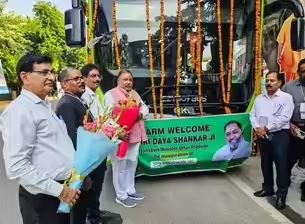Greater Noida–Dehradun Gets Electric: New E-Bus Service Redefines Long-Distance Travel
Travel between Greater Noida and Dehradun just got cleaner, cheaper, and smarter with the introduction of eco-friendly electric buses. The new service aims to cut pollution, reduce travel costs, and make long-distance journeys more sustainable. Here’s everything you need to know about the route, benefits, passenger experience, and how this step is reshaping intercity transport in India.


By: Bharat Daily Samachar Date: 27 Sep,2025
The journey from Greater Noida to Dehradun has always been a popular route for tourists, students, and professionals. Now, it is about to become greener and more comfortable, thanks to the introduction of electric bus (e-bus) services. This initiative is not only a big relief for regular travelers but also a step towards India’s larger vision of clean energy and sustainable transportation.
A New Era of Travel Between NCR and Uttarakhand
For years, diesel buses and private cars have dominated the road between Greater Noida and Dehradun. While functional, they have contributed significantly to carbon emissions, air pollution, and rising travel costs. With the launch of eco-friendly e-buses, passengers now have a modern alternative that is both environmentally responsible and convenient.
The service aims to connect the fast-growing hub of Greater Noida in NCR with Dehradun, the gateway to the Himalayas. Whether it’s for business, education, or leisure, this route is one of the busiest, and the addition of electric buses could change the way people travel between these two cities.
Key Features of the E-Bus Service
The newly launched e-buses come equipped with modern facilities designed to ensure comfort, safety, and reliability. Here’s what passengers can expect:
Zero Emissions: Being fully electric, the buses do not release harmful pollutants, making them a clean alternative to traditional fuel-based transport.
Comfortable Interiors: Spacious seating, air-conditioning, and ergonomic design ensure a smooth ride even on long journeys.
Lower Noise Levels: Unlike diesel buses, e-buses operate quietly, offering passengers a more peaceful travel experience.
Affordable Travel: Operational costs are lower for electric buses, which translates to competitive ticket prices for travelers.
Safety Features: Advanced braking systems, GPS tracking, and CCTV cameras provide a safe journey for all passengers.
Why This Matters for Travelers
For daily commuters, students, and tourists, this service opens up new possibilities:
Cost Savings: With rising fuel prices, e-buses provide a cheaper alternative for long-distance travel.
Convenience: Regular schedules, easy bookings, and predictable travel times make planning trips easier.
Eco-Friendly Choice: Passengers get the satisfaction of reducing their carbon footprint while traveling.
Comfort Upgrade: The experience is closer to premium bus services, offering modern comfort at affordable rates.
Environmental Impact
India has been battling rising levels of air pollution, especially in the NCR region. The addition of e-buses is expected to make a noticeable difference over time. Each e-bus replaces a diesel bus that would otherwise emit tons of carbon dioxide and other harmful gases annually.
By switching to electric mobility, Greater Noida and Dehradun are setting a strong example for other intercity routes across the country. Not only does this reduce dependence on fossil fuels, but it also supports India’s commitment to clean energy goals.
Boost to Tourism and Connectivity
Dehradun is not just a state capital; it is also a gateway to some of India’s most loved tourist destinations such as Mussoorie, Rishikesh, and Haridwar. A cleaner, more reliable travel option can give a big push to tourism in Uttarakhand.
For residents of Greater Noida and other NCR areas, the e-bus service makes weekend trips and holidays more appealing. Tourists will now have an eco-friendly way to reach the hills, reducing the environmental impact of tourism in the region.
Government’s Push Towards Electric Mobility
The launch of this service aligns perfectly with the government’s larger mission to promote electric mobility. Various central and state government policies under the FAME (Faster Adoption and Manufacturing of Hybrid and Electric Vehicles) scheme are encouraging transport operators to adopt electric vehicles.
The Greater Noida–Dehradun e-bus service is not an isolated project—it is part of a wider movement to transform India’s transportation system into one that is modern, sustainable, and less dependent on fossil fuels.
Challenges Ahead
While the initiative is promising, it comes with challenges:
Charging Infrastructure: Setting up enough fast-charging stations along the route is critical to ensuring smooth operations.
Battery Life and Maintenance: Long routes require reliable battery technology, which needs continuous monitoring.
Public Awareness: Many travelers are still unfamiliar with electric buses, and it will take time for trust and habit to build.
Despite these challenges, the launch marks a turning point and signals a gradual but steady shift towards greener intercity travel.
What Passengers Are Saying
Early passengers who have tried the service are sharing positive feedback. Many appreciate the comfort, while others are happy with the competitive pricing. Eco-conscious travelers especially welcome the initiative, seeing it as a practical way to contribute to reducing pollution.
Social media buzz also reflects excitement, with users praising the government and private operators for introducing sustainable travel options.
Conclusion: A Step Towards Cleaner Travel
The launch of e-bus services from Greater Noida to Dehradun is more than just a transport update—it represents a change in mindset. It shows how technology, policy, and public demand can come together to build a cleaner, safer, and more sustainable future.
For travelers, it is a win-win situation: affordable, comfortable, and environmentally friendly travel at their doorstep. For the nation, it is a move closer to energy security, reduced emissions, and smarter urban mobility.
As more routes adopt electric buses, India’s dream of becoming a leader in green mobility looks increasingly achievable. And for passengers on the Greater Noida–Dehradun route, the future of travel has already arrived—silent, smooth, and sustainable.
